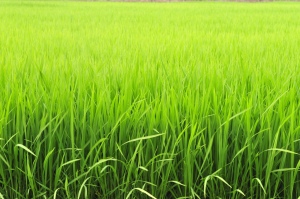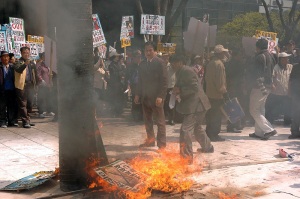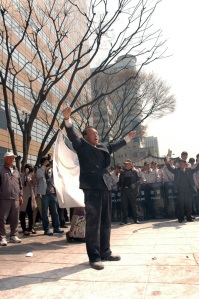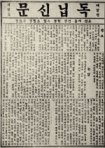According to the Hankyoreh Seoul’s policy of witholding rice aid to North Korea is driving down the price of of the grain, prompting thousands of farmers to take to the streets in protest.
Approximately 30 thousand South Korean farmers convened together for a National Farmers’ Convention to ask the government to address plummeting rice prices on Tuesday.
The main cause of plummeting rice prices is the government’s decision not to send rice aid to North Korea, (they said)… During the previous administration, 400 thousand tons of rice were sent to North Korea annually, whereas the current administration has stocked up over 800 thousand tons of rice. (Protesters) say the excess reserves of rice are one of the main causes of the steep decline in the price of rice.
As if to add insult to injury, Seoul recently offered 10,000 tons of imported corn aid to Pyongyang, which further riled local rice growers and was, being far less than what was expected, rebuffed by the North as “narrow minded.”
With this year being a bumper crop year, a bag of 80 kilograms of rice is now traded at around 130,000 won, about 15 percent lower than last year.
Farmers are razing rice paddies out of anger, stacking bags of rice outside as they run out of storage space and dumping the surplus rice in the South while millions of people are starving in the North as they are short of some 800,000 tons of rice…
According to the local human rights group Good Friends, parts of North Korea are suffering from one of the worst food shortages in over eight decades. “People live on acorns and herbs they collect in mountains while the better-off eat mostly porridge to save rice, not just in Hamgyeong but also in South Pyongan Province,” it said.
A more salient factor behind the drop in prices could be the fact that Koreans are simply eating less of the one-time staple, and much of what they are eating is increasingly coming from overseas. As globalization continues to take hold, the local diet has become far more international.
Rice, which once determined a person’s financial status and served as the beloved staple of Korean food, is becoming less symbolic and losing its appeal here as the country increasingly opens its palate to the world and moves toward globalization.
During the 1980s, the average Korean consumed 130 kilograms of rice annually. As of last year, it stood at 76 kilograms, which is roughly equivalent to two servings a day versus four several decades ago.
One of the approaches to resolving the dilemma facing farmers is promoting consumption of rice-based products like makkeolli, the fermented rice wine that goes oh so well with a meal of barbecued bacon.
Exports of traditional Korean rice wine surged by more than 20 percent in the first nine months of this year mainly due to strong demand from Japan, a government report said yesterday.
Exports of makgeolli, or rice wine, reached $3.56 million totaling 4,380 tons up until September, the Korea Customs Service said.
I’ve recently spotted canned versions of the drink, which usually come in plastic green bottles. I even saw a packet of garlic flavored makkeolli. But again, the problem is that most of the rice used to produce makkeolli and similar rice based products comes from abroad, meaning local farmers are not likely to benefit from the stronger sales.
Filed under: food, Headlines, North Korea, Politics | Tagged: candle light protests, food, North Korea, protests, Seoul | 1 Comment »






 I humiliated a little kid recently, mistook his innocent curiosity for veiled racism and threw it back at him in spades.
I humiliated a little kid recently, mistook his innocent curiosity for veiled racism and threw it back at him in spades.












